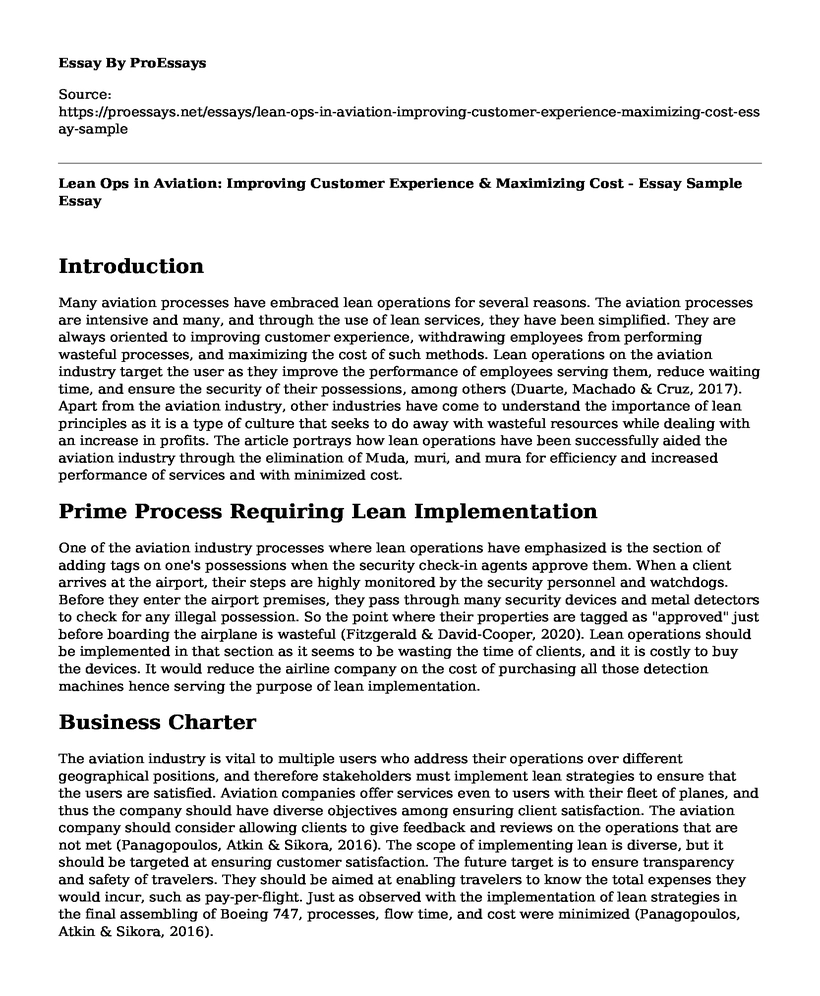Introduction
Many aviation processes have embraced lean operations for several reasons. The aviation processes are intensive and many, and through the use of lean services, they have been simplified. They are always oriented to improving customer experience, withdrawing employees from performing wasteful processes, and maximizing the cost of such methods. Lean operations on the aviation industry target the user as they improve the performance of employees serving them, reduce waiting time, and ensure the security of their possessions, among others (Duarte, Machado & Cruz, 2017). Apart from the aviation industry, other industries have come to understand the importance of lean principles as it is a type of culture that seeks to do away with wasteful resources while dealing with an increase in profits. The article portrays how lean operations have been successfully aided the aviation industry through the elimination of Muda, muri, and mura for efficiency and increased performance of services and with minimized cost.
Prime Process Requiring Lean Implementation
One of the aviation industry processes where lean operations have emphasized is the section of adding tags on one's possessions when the security check-in agents approve them. When a client arrives at the airport, their steps are highly monitored by the security personnel and watchdogs. Before they enter the airport premises, they pass through many security devices and metal detectors to check for any illegal possession. So the point where their properties are tagged as "approved" just before boarding the airplane is wasteful (Fitzgerald & David-Cooper, 2020). Lean operations should be implemented in that section as it seems to be wasting the time of clients, and it is costly to buy the devices. It would reduce the airline company on the cost of purchasing all those detection machines hence serving the purpose of lean implementation.
Business Charter
The aviation industry is vital to multiple users who address their operations over different geographical positions, and therefore stakeholders must implement lean strategies to ensure that the users are satisfied. Aviation companies offer services even to users with their fleet of planes, and thus the company should have diverse objectives among ensuring client satisfaction. The aviation company should consider allowing clients to give feedback and reviews on the operations that are not met (Panagopoulos, Atkin & Sikora, 2016). The scope of implementing lean is diverse, but it should be targeted at ensuring customer satisfaction. The future target is to ensure transparency and safety of travelers. They should be aimed at enabling travelers to know the total expenses they would incur, such as pay-per-flight. Just as observed with the implementation of lean strategies in the final assembling of Boeing 747, processes, flow time, and cost were minimized (Panagopoulos, Atkin & Sikora, 2016).
Current Activity Determining Improvement Initiative
As stated above, stakeholders should be informed about the processes requiring improvements. This is because they are the ones in a position to authorize turn of how the activities are executed. In the example where tags of verification are attached to travelers' possessions, they can approve lean operations to be implemented in terminating how the bags are vetted. It is a case of overproduction and the fact that users do not pay for it; it adds no value. Applying the "approved" tags on carry-ons also takes time, which proves to be wasteful (Shafeek, 2019). Instead, the process would be upgraded to ensuring that bag length and weight are the ones that are controlled.
Wastes Identified
The Muda I have identified in the process is that time resources are wasted while vetting the bags. They are checked repeatedly before the approval, and it proves to be time-consuming. Burden and unevenness are spectated because there has been an increasing number of travelers who operate and check-in online. Such do not have they carry-ons to be vetted hence proving muri and mura.
Conclusion
When lean strategies are implemented in industry, several factors such as increased performance of services is observed. In our case, they have helped us to determine that vetting of travelers' carry-ons incurs an unwanted airport cost. Therefore, when the stakeholders take note and implement lean operations, the cost would reduce in the competitive aviation companies.
References
Duarte, S., & Cruz, Machado, V. (2017). Green and lean implementation: An assessment in the automotive industry. International Journal of Lean Six Sigma, 8(1), 65-88. https://doi.org/10.1108/ijlss-11-2015-0041
Fitzgerald, P. P., & David-Cooper, R. (2020). Corporate social responsibility in the aviation industry. Sustainable Development, International Aviation, and Treaty Implementation, 312-343. https://doi.org/10.1017/9781316594216.016
Panagopoulos, I., Atkin, C., & Sikora, I. (2016). Lean six-sigma in aviation safety: An implementation guide for measuring the aviation system's safety performance. Journal of Safety Studies, 2(2), 30. https://doi.org/10.5296/jss.v2i2.10438
Shafeek, H. (2019). Lean manufacturing implementation in the Carton industry - A case study. 2019 Industrial & Systems Engineering Conference (ISEC). https://doi.org/10.1109/iasec.2019.8686603
Cite this page
Lean Ops in Aviation: Improving Customer Experience & Maximizing Cost - Essay Sample. (2023, May 06). Retrieved from https://proessays.net/essays/lean-ops-in-aviation-improving-customer-experience-maximizing-cost-essay-sample
If you are the original author of this essay and no longer wish to have it published on the ProEssays website, please click below to request its removal:
- The Federal Aviation Act of 1958 Essay
- Inquiry Methods in Aircraft Accidents Paper Example
- Assignment Example on Alaska Airline
- Own Your Suppliers: Merging in Aircraft Parts & Benefits - Essay Sample
- Article Analysis Essay on Hans Eysenck
- 96% of Air Crashes in 2014: The Unsatisfactory Reality - Essay Sample
- Essay on Alaska Airlines: America's Largest Airline & Leader in Customer Satisfaction







